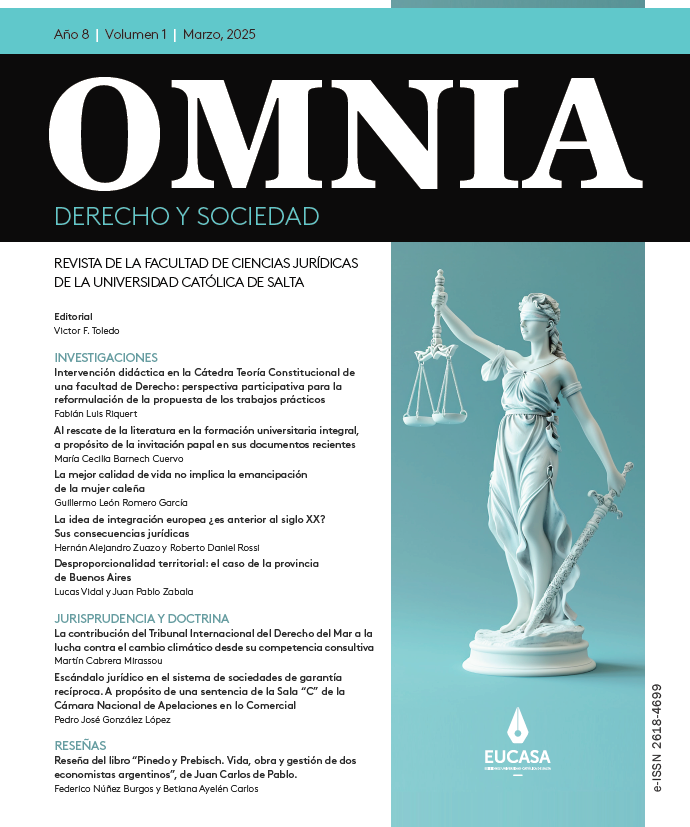Ser o no ser de las medidas de seguridad.
To be or not to be of security measures: their validity and implementation following the enactment of the National Mental Health Law
Abstract
The purpose of this work is to determine whether, following the enactment of the National Mental Health Law, the security measures provided for in Article 34, Section 1 of the Penal Code and the dualist system of Argentine criminal law remain fully in force today. To this end, the study begins with a genealogy of security measures as penal institutions, examining their application and scope within national positive law. Subsequently, the validity of imposing security measures through dismissal or acquittal under Article 34, Section 1 of the Penal Code is analyzed in relation to both international human rights treaties and the National Mental Health Law. Through this normative analysis, points of connection have been identified that support not only the validity of the coexistence of both legal frameworks but, more importantly, the fact that the incorporation of the National Mental Health Law has strengthened the rights and guarantees of individuals subjected to security measures due to mental health conditions.
Downloads
References
• Alderete, C. M. (2022). Salud mental y derecho penal. TR LA LEY AR/DOC/2453/2022.
• Asociación de Magistrados de Tucumán. (2024, 9 de agosto). Dr. Javier de la Fuente - Medidas de seguridad para incapaces de culpabilidad [Video]. YouTube. https://www.youtube.com/watch?v=tsv8VtLKwk4
• Bacigalupo, E. (1999). Derecho Penal. Parte General (2ª ed.). Buenos Aires: Hammurabi.
• Caride, M. C. (2013). Medidas de seguridad, derechos de las personas internadas y Ley de salud mental. Revista Derecho Penal, Año II(5), 155. Ediciones Infojus.
• De la Fuente, J. E. (1998). “Medidas de seguridad para inimputables”. Separata de Cuadernos de doctrina y jurisprudencia penal, Año IV(8), A.
• Donna, E. A. (2013). Derecho Penal. Parte General. Tomo IV. Teoría General del delito-III. Santa Fe: Rubinzal-Culzoni.
• Donna, E. A. (2014). Derecho Penal. Parte General. Tomo II. Teoría General del delito-I. Santa Fe: Rubinzal-Culzoni.
• Ferrajoli, L. (2011). Derecho y Razón. Teoría del garantismo penal (10ª ed.). Madrid: Trotta.
• Fontán Balestra, C. (1998). Derecho Penal. Introducción y parte general. Buenos Aires: Abeledo-Perrot.
• Frisch, W. (2007). Las medidas de corrección y seguridad en el sistema de consecuencias jurídicas del Derecho penal: Clasificación en las teorías de la pena, configuración material y exigencias en el Estado de Derecho. InDret, 3-2007.
• Frister, H. (2016). Derecho Penal. Parte General. Buenos Aires: Hammurabi.
• Hegglin, M. F. (2016). La inconstitucionalidad de las medidas de seguridad impuestas como consecuencia de la suspensión del proceso penal por discapacidad psicosocial del imputado: El caso del señor Acosta. Revista del Ministerio Público de la Nación, Año 11.
• Muñoz Conde, F. (2001). Introducción al Derecho Penal (2ª ed.). Montevideo-Buenos Aires: B de F.
• Nuñez, R. (1999). Manual de Derecho Penal. Parte general (4ª ed.). Córdoba: Marcos Lerner Editora Córdoba.
• Righi, E. (2003). La culpabilidad en materia penal. Buenos Aires: Ad-Hoc.
• Ríos, S. R. (2017). Interpretación del art. 34 inc. 1 del Código Penal Argentino a la luz de la Ley Nacional de Salud Mental. Consecuencias. La situación de las personas con declaración de inimputabilidad en la Provincia de Buenos Aires. Derechos En Acción, (4). https://doi.org/10.24215/25251678e056
• Roxin, C. (2015). Derecho Penal. Parte General. Tomo I. Fundamentos. La Estructura de la Teoría del Delito (Traducción de la 2ª ed. alemana). Madrid: Civitas.
• Rusconi, M. (2016). Derecho Penal. Parte General (3ª ed.). Buenos Aires: Ad-Hoc.
• Yankielewicz, D. L., & Olmo, J. P. (2015). Medidas de seguridad en el ámbito penal: Incidencia de la Ley Nacional de Salud Mental. TR LA LEY AR/DOC/699/2015.
• Zaffaroni, E. R., Alagia, A., & Slokar, A. W. (2011). Derecho Penal: Parte General (2ª ed.). Buenos Aires: Ediar.
• Zysman Quiros, D. (2012). Genealogía del Castigo. Buenos Aires: Didot.
Copyright (c) 2025 Diego Leonel Feustel

This work is licensed under a Creative Commons Attribution-NonCommercial-ShareAlike 4.0 International License.








